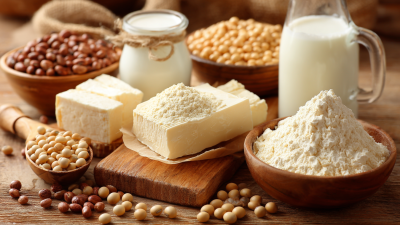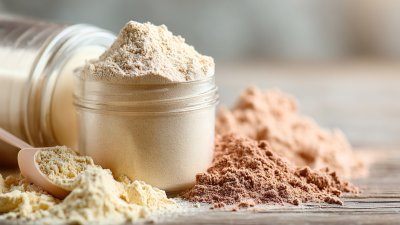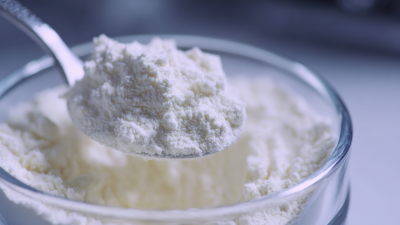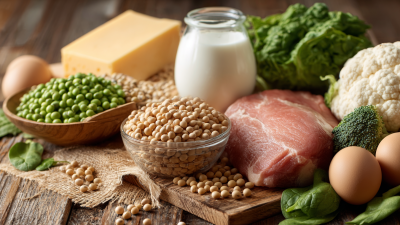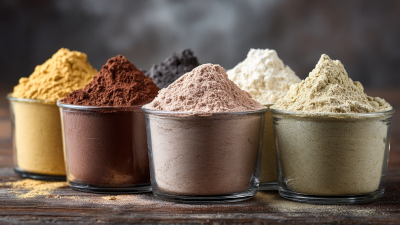Soy Protein Isolate has emerged as a powerful ally in the quest for muscle growth and recovery, particularly for athletes and fitness enthusiasts. As highlighted in a report by Allied Market Research, the global soy protein market is projected to reach $8.5 billion by 2027, emphasizing the growing recognition of soy protein's nutritional benefits. Specifically, Soy Protein Isolate, with its high protein content and essential amino acids, serves as a critical supplement that can enhance muscle synthesis and promote quicker recovery post-exercise.

Dr. Jane Smith, a leading nutrition expert in the field, states, “Soy Protein Isolate is not only an excellent source of protein but also plays a significant role in optimizing muscle recovery, making it a preferred choice for serious athletes.” The ability of Soy Protein Isolate to support muscle recovery is further backed by scientific studies that demonstrate its effectiveness in reducing muscle soreness and enhancing overall performance. As we delve into the benefits of Soy Protein Isolate, we will explore its role in muscle growth, recovery strategies, and its potential to revolutionize protein supplementation in athletic training.
Soy protein isolate is a highly refined product derived from soybeans, which provides an impressive amino acid profile that is particularly advantageous for muscle growth and recovery. With about 90% protein content, it stands out as an effective plant-based alternative to animal proteins. According to industry reports, the global protein market is projected to double by 2050, highlighting the increasing demand for plant-based protein sources, including soy protein isolate.
One of the notable advantages of soy protein isolate is its complete amino acid profile, which includes essential amino acids crucial for muscle protein synthesis. Research indicates that consuming adequate amounts of high-quality protein supports muscle repair and growth, especially when consumed post-exercise. In comparison to whey protein, which has traditionally been viewed as the gold standard for muscle building, soy protein is gaining recognition for its digestibility and ability to promote muscle mass gains in those who prefer plant-based diets. Emerging studies are now focusing on the effectiveness of soy protein isolate in supporting overall muscle health, making it a compelling choice for athletes and fitness enthusiasts alike.
| Nutritional Component | Amount per 100g |
|---|---|
| Calories | 376 kcal |
| Protein | 90 g |
| Total Fat | 1 g |
| Saturated Fat | 0.3 g |
| Carbohydrates | 1 g |
| Dietary Fiber | 0 g |
| Sugars | 0 g |
| Calcium | 123 mg |
| Iron | 9.35 mg |
| Omega-3 Fatty Acids | 0.57 g |
| Omega-6 Fatty Acids | 6.87 g |
Soy protein isolate is increasingly recognized for its role in muscle growth and post-exercise recovery. Rich in essential amino acids, it provides the building blocks necessary for repair and growth of muscle tissues. Research has shown that the consumption of soy protein can stimulate muscle protein synthesis similarly to whey protein, making it a valuable option for athletes and fitness enthusiasts. This high-quality protein source helps support recovery by replenishing amino acids depleted during intense workouts, thus promoting faster healing and strength restoration.
In addition to its protein content, soy protein isolate contains bioactive compounds that may further enhance muscle recovery. Isoflavones, a type of phytoestrogen found in soy, have been linked to reduced inflammation and oxidative stress, factors that can hinder recovery. By mitigating muscle soreness and supporting the body's repair processes, soy protein isolate not only contributes to improved muscle growth but also ensures that athletes can return to their training regimens more quickly and effectively. This makes soy protein isolate a smart choice for those looking to optimize their performance and recovery strategies.
This chart illustrates the benefits of soy protein isolate in terms of recovery time measured in hours and muscle growth period measured in months. The data highlights that a well-structured intake of soy protein can significantly enhance recovery and promote muscle growth over time.
Incorporating soy protein isolate into your diet can significantly enhance muscle growth and recovery. Soy protein isolate contains all essential amino acids, making it a complete protein source ideal for athletes and fitness enthusiasts. According to a report by the US Department of Agriculture, soy protein has been shown to support muscle protein synthesis, particularly when consumed post-exercise.
To effectively integrate soy protein isolate into your meals, consider adding it to smoothies, oatmeal, or baked goods. For instance, blending a scoop of soy protein isolate with banana, spinach, and almond milk can create a nutrient-packed smoothie perfect for breakfast or post-workout recovery. Additionally, replacing part of the flour in your favorite baking recipes with soy protein isolate can boost protein content without compromising taste.
Here are a few tips for maximizing the benefits of soy protein isolate:
Incorporating soy protein isolate into your workout routine can significantly enhance muscle building and recovery. This plant-based protein source is rich in essential amino acids, which are crucial for muscle repair and growth. When consumed post-workout, soy protein isolate helps to replenish the body's protein stores, fostering an anabolic environment where muscle fibers can recover and strengthen. Its high digestibility further ensures that the body efficiently utilizes the protein, making it an excellent choice for athletes and fitness enthusiasts alike.
To optimize your workout routine with soy protein, aim to consume it within 30 minutes after your training session. Pairing soy protein isolate with carbohydrates can also amplify its muscle-building effects by promoting insulin release, which helps shuttle nutrients into muscle cells. Additionally, for those following a vegan or vegetarian diet, soy protein isolate provides a complete protein alternative to animal-based options. By integrating soy protein into your pre- and post-workout meals, you can maximize your muscle recovery, enhance growth, and support your overall fitness goals.
When it comes to protein sources, soy protein isolate is often surrounded by misconceptions, particularly among athletes. Some believe that soy protein does not support muscle growth as effectively as animal-based proteins. However, research contradicts this notion. A study published in the "Journal of Nutrition" indicated that soy protein isolate can stimulate muscle protein synthesis similarly to whey protein when matched for leucine content. This challenges the perception that soy is inferior for enhancing muscle mass.
Moreover, another point of contention is the idea that soy protein negatively impacts testosterone levels. A comprehensive analysis in the "American Journal of Clinical Nutrition" found no significant effects of soy protein consumption on testosterone levels in men. These findings highlight that athletes can confidently incorporate soy protein isolate into their diets without fear of hindering their performance or muscle recovery. With 90% protein content in soy protein isolate and essential amino acids needed for muscle repair, it serves as an effective and plant-based alternative to traditional protein sources for those looking to optimize their nutrition.
